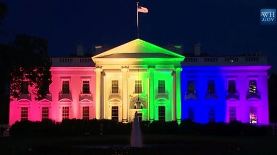When the United States Supreme Court ruled on marriage equality last month, there was much celebration. It was a moment that I was sure would come someday, but one which, frankly, I never thought I would live to see. Yet while it was a monumental step forward for American society, I had to walk away from the cheering and the champagne toasts.
In that moment, I was overcome by sadness. Although certainly a milestone for the LGBT community, my sense of joy was overshadowed by thoughts of unspeakable suffering endured by so many who spent their lives frozen in fear, rejection, and shame. So many people who could have enjoyed beautiful, loving connections with friends, families, and mates lived, instead, either in isolation or in radical opposition to society. Some chose to hide their truest selves from the world, while others engaged in aggressive sexual activity that exploded after the 1969 Stonewall riots. In either case, the opportunity to form healthy relationships was often a casualty of rampant homophobia.
Some people denied themselves any possibility of living their lives with a loving companion. They convinced themselves that hiding in carefully guarded isolation and loneliness was preferable to the hatred and ostracism they were sure would await them. Others, feeling hopelessly incapable of enduring the fear, rejection, and shame chose to end their lives.
What makes the Supreme Court ruling so important and, at the same time, so appallingly overdue is the government-sanctioned homophobia that was, once and for all, quashed last month. It isn’t so much that the official homophobic policies themselves were so offensive (which, of course, they were) but the impact they had on individual lives was devastating. Even the lucky member of the LGBT community who found support of family and friends was formally declared “less than” by the U.S. government.
One of the hallmarks of our military’s tradition is “honor: a code of personal integrity” [www.marines.com]. Yet “don’t ask, don’t tell” commanded military personnel to lie about a significant facet of their fundamental essence. How can anyone grow into a healthy person of integrity when they are being told that lying is, simultaneously, dishonorable and required?
It is even more galling that government-sanctioned homophobia emanated directly from the White House. Deliberately playing on homophobic ignorance and fear, George W. Bush’s supporters sought to place anti-gay initiatives on many state ballots with the express intention of mobilizing their conservative constituents to vote in the 2004 election. That same year, the president called for a constitutional amendment banning same-sex marriage. Now imagine how a teen, wrestling with his/her sexuality, felt when the president of the United States came out in favor of changing the constitution of arguably the world’s premier democracy to enshrine discrimination aimed squarely at their hearts. Imagine how he/she felt hearing about the hideously-named, Clinton-era Defense of Marriage Act. A law had to be passed to defend one of society’s most important social institutions against a group of repugnant individuals such as themselves? And how much violence aimed at LGBT people was perpetrated by those who felt emboldened in their hatred of the gay community because a cynical government said that homophobic feelings were justified. While politicians “of course” would never condone gay-bashing, you cannot sidestep responsibility for an uncontrollable wildfire that results from pouring gasoline on an open flame.
So, one of the monumental results of last month’s Supreme Court decision was putting an end to legal, government-issue discrimination. And for me, the most powerful and moving symbol of that historic day came as night fell. As the skies grew darker, this image, broadcast by television stations everywhere, became increasingly vivid:
Imagine that sam e, frightened teen seeing the White House — previously a beacon of discrimination — lit up in rainbow colors. Imagine now that they can see the possibility of a healthy, loving future radiating from that great symbol of our country.
e, frightened teen seeing the White House — previously a beacon of discrimination — lit up in rainbow colors. Imagine now that they can see the possibility of a healthy, loving future radiating from that great symbol of our country.
There is new hope now — a long time coming. But as we join the celebration, may we not forget all those who have been casualties of the hatred and the fear. Let the colors of the rainbow shining on the White House be both a memorial light and a light of hope. And let us pray that, going forward, we can all find our unique and deserved place in a world founded on integrity and love.




